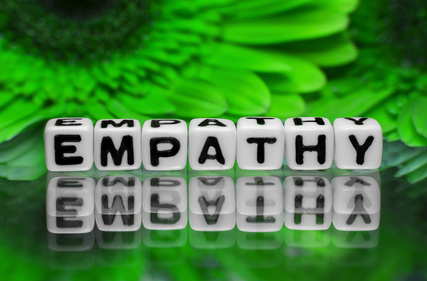Empathy is both feeling for, and imagining another person’s point of view and perspective. For many of us, living in a pandemic has made empathising with others seem much more intense. With so much change happening to everyone, there is almost an overload of empathy that makes it harder to keep up with on top of your own experiences.
The “we’re all in this together” phrase was repeated over and over again in 2020 when it has become glaringly obvious there is so much disparity when it comes to COVID-19. Yet there is one thing we can be united on: how the pandemic affects our mental health. Empathy is the great healer yet can be a challenge to harness in times of division.
No matter our status or background, grief, stress and uncertainty catapult the body into survival mode, scrambling our emotional radar in the limbic region of our brain, making it more exhausting to then also feel for others. Stress and uncertainty impact the prefrontal cortex that fosters rational thought, the kind that helps us step back and take in another person’s perspective before responding. Yet if we can harness empathy and use it, we have a much better chance of really understanding where our young people (and we ourselves) are at. Understanding leads to stronger solutions, more effective responses and real strength. Empathy fuels connection and also helps you regulate your emotions in times of stress.
Continuing this brand new series “7 Skills for Right Now”, designed to equip young people with guidance and support to enable them to thrive amidst uncertainty and change. These skills make a huge different in changing perceptions, raising awareness and strengthening confidence.
“True empathy requires that you step outside your own emotions to view things entirely from the perspective of the other person.”
What are the 7 Skills? Grounded in research and in experiential learning workshops run with lawyers, medical practitioners and university students world-wide, we each have unlimited capacity to develop adaptability, critical thinking, empathy, integrity, optimism, proactivity and resilience. When everything around you is deeply uncertain, when you feel anxious, when you’re surrounded by rapid change, the best thing you can do is dig deep and harness these skills. They will enable all of us, to better manage this new environment and our constantly changing personal and professional landscape.
This week: EMPATHY
 Empathy, or being able to understand at an emotional level what someone else is going through, is part of what makes us human. It also provides several important benefits. According to psychologists, empathy makes it easier to build social connections because by understanding what someone else is feeling, you can respond more appropriately. Practicing empathy better equips you to manage your emotions, which can help you from feeling overwhelmed. When you show empathy for others, you’re more likely to help them and positively influence a stressful situation for the better.
Empathy, or being able to understand at an emotional level what someone else is going through, is part of what makes us human. It also provides several important benefits. According to psychologists, empathy makes it easier to build social connections because by understanding what someone else is feeling, you can respond more appropriately. Practicing empathy better equips you to manage your emotions, which can help you from feeling overwhelmed. When you show empathy for others, you’re more likely to help them and positively influence a stressful situation for the better.
Empathy takes practice! And effort! But through small daily steps you can strengthen this skill and experience immediate positive impact.
““All I ever wanted was to reach out and touch another human being not just with my hands but with my heart.” ― Tahereh Mafi
Digital creator Dylan Marron explains how sometimes the most subversive thing you can do is actually speak with people you disagree with, not simply at them.
Here are some tips for tapping into this vital skill:
Be fully present. When you give the gift of your attention, you are valuing the other person and this is high currency. Get rid of any distractions, take some deep breaths and bring yourself to the present moment. Making time to connect with others (ideally in person but if this is not an option, then virtually) can make all the difference. Listen actively to what others are saying rather than mentally rehearsing your response. Know that you will have to work harder to do this online.
Be considerate. If emails and instant messaging have happening more than in-person conversations, pay more attention to your tone to avoid unintentionally confusing or stressing the person on the receiving end of your message. Your language is also important, so you may want to watch for statements that come across as judging or criticising rather than acknowledging and moving the conversation
Be kind. As you’re able to tune in to the feelings of others, you will find it easier to practice simple acts of kindness. Just taking a few minutes for everyone to say hello on a call before diving into the agenda helps to lighten the mood, which sets us up for a more productive virtual meeting. Giving a friend, colleague or fellow student a few words of encouragement – such as letting them know they’re doing a great job – can also make a significant impact. Being kind not only benefits the recipient; science has shown that practicing kindness lowers stress levels and blood pressure while increasing energy.
Practice and encourage others to do so also. Acceptance is not passive – is the ability to move yourself to a place where you genuinely accept the circumstances for that day. To do this you first need to acknowledge how you are feeling OR let the person you are speaking with do so. Being able to identify and name these feelings releases neurotransmitters in the brain that quiets the body’s “fight-or-flight” response, which typically springs into action during times of stress. Once the body is no longer on high alert, we can tune in to other people’s experiences.
Prioritise self-care. Tending to our own needs expands our ability to care for others and we need to do this more in times of stress and uncertainty. Now, this doesn’t mean we should overly indulge and drink our troubles away but it’s scientifically proven that spending time outdoors, listening to music, or practicing mindfulness can calm and nourish the soul.
The good news: we don’t need to block off hours each day for self-care. As with any new goal, starting small can make a difference. To begin, consider taking ten minutes to step away from stimulation, like social media, and replace scrolling through Instagram with a soothing activity. Not only will doing so improve your mental health, it will also benefit the well-being of those around you.
Start practising mindfulness – if you are not doing so already, make time each day for silence, breathing, bringing yourself back to the present moment. Not only is mindfulness connected with strengthening the brain’s natural empathy neurons, by doing so you will be responding from a place of calm. This is especially important when it comes to not overwhelming yourself with the stresses of others.
True empathy is about allowing and acknowledging where other people are at but also building your own self-awareness and capacity to respond from a stronger place. Encourage young people in your life to do this. These emotional exercises will help build an empathy muscle that grows stronger each day.
